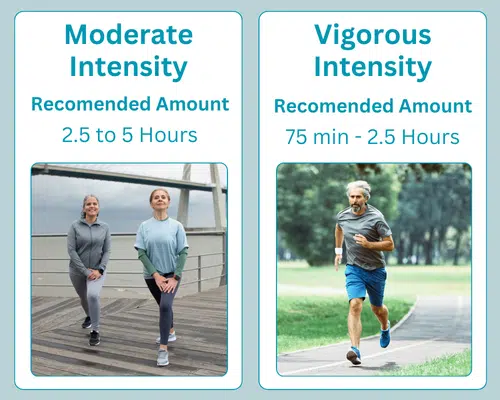Everyone says you should exercise. Exercise should continue throughout your life. In fact, as we age it becomes even more important. According to the Physical Activity Guidelines for Americans, 2nd edition, published by the Department of Health and Human Services, there are both immediate and long-term benefits of exercise.
The immediate effect of exercise can be an improvement in sleep. Moving your body and breaking a sweat can also help ease anxiety and improve blood pressure.
The long-term benefits of exercise affect your whole body. Certainly, exercise can help to burn calories to help with weight management and reduce blood sugars and diabetes risk. In addition, exercise keeps our heart healthy, decreasing our risk of heart attack and stroke. Your doctor may also ask you to walk to improve your bone health. Recent data suggests that regular exercise can also reduce the risk of dementia.
Exercise helps to improve strength and remain strong and independent. Adding strength exercises has been shown to reduce the risk of falls. Strong muscles help with balance and allow you to catch yourself if your trip or walk on unstable ground.
Cancer prevention is another area of benefit. Regular exercise has been shown to help prevent eight different types of cancer, including bladder, breast, colon, endometrium, esophageal, kidney, lung and stomach. Certainly, there are other contributing causes of cancer, but exercise is one way to decrease your cancer risk.
How much exercise is needed to reap these benefits? For substantial health benefits, adults should do at least 150 minutes (2 hours and 30 minutes) to 300 minutes (5 hours) a week of moderate-intensity, or 75 minutes (1 hour and 15 minutes) to 150 minutes (2 hours and 30 minutes) a week of vigorous-intensity aerobic physical activity, or an equivalent combination of moderate- and vigorous-intensity aerobic activity. Preferably, aerobic activity should be spread throughout the week. What is “moderate intensity” versus “vigorous intensity” exercise? A person doing moderate-intensity aerobic activity can talk, but not sing, during the activity. A person doing vigorous-intensity activity cannot say more than a few words without pausing for a breath. In addition, ideally, muscle strengthening activities are encouraged twice weekly.

The effects of aging can result in arthritis or other ailments that may affect movement and flexibility. If you cannot do 150 minutes of moderate-intensity aerobic activity a week because of chronic conditions, set a goal to be as physically active as your abilities and conditions allow. Start slow and gradually increase activity. Exercise components should include balance training as well as aerobic and muscle strengthening activities. It may be helpful to work with a trainer or physical therapist. Options for exercise are endless. Grab a pair of walking sticks and hit the trails or sidewalks. Check out the community center for Pilates or yoga. Get in the pool to swim or try water aerobics. Remember that all activity counts. Raking leaves, pushing a lawn mower or gardening are all great forms of exercise. Carrying groceries would count as a strength option.
If you have questions about exercise options, particularly if you have health issues, please ask your physician for guidance. Set your exercise goals to move your body every day. Our goals may change as we age, but in general, try to move more and sit less. Remember, every step counts.
Check out these resources to help increase your physical activity:
- National Institute on Aging: Motivation Tips, Goal Tracking, Exercise for chronic conditions …
- Sit and Be Fit: Senior Chair Exercise Programs
- Silver Sneakers: Live online classes, Fitness App, Covered Fitness Center Locator…
- Get Moving Towards Better Health: An informative article by Lakeview Physician, Leah Clark.

Sandra Beulke, M.D.
Dr. Beulke joined Lakeview Clinic in April 2003. She provides the full spectrum of family medicine, including gynecology, pediatrics and geriatrics. She has special interest in women’s health and diabetes care. Dr. Beulke serves as Lakeview Clinic’s Medical Director and is active on several committees which aim to promote quality and reliability in health care.
